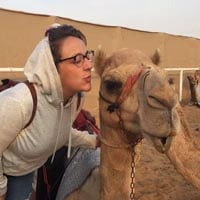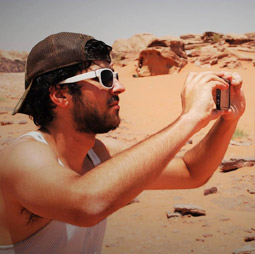10 Things I Love About Teaching English in the Middle East
Written By: Adam Lucente | Updated: June 29, 2023
Written By: Adam Lucente
Updated: June 29, 2023

People often ask those of us who teach in the Kurdistan Region of Iraq “why Iraq?”. There is a lot to love about teaching English here, and throughout the Middle East, that you may not expect from the headlines. Here are ten:
1. The Conversations
I’ve never met more fascinating people than during my time here. When I play Call of Duty with my roommate, he sometimes remarks how some of the levels resemble his neighborhood in Baghdad. You don’t think about this when you play video games in the states. My friends in Erbil have lived through a lot of history, and often share. In a given week, I may hear about my one colleague’s time fighting against Saddam Hussein in the mountains in a mixed Christian-Kurdish force, or another friend’s experience hunting in the deserts of Anbar, which I vow to try one day. I learn so much about the region from conversations with friends, taxis, shop owners, and others.
2. The Nature
Friends tend to ask me “how’s the desert?” when we catch up. The Middle East is full of a lot of deserts, no doubt. However, the landscape is much more than that. I love the deserts of Wadi Rum, but also the lush green valleys of Amedi in Iraq and the pristine beaches of Lebanon. If you want to teach in a place where in your off time you can hike off the beaten path away from loads of tourists, then try the Middle East.
3. The Food
Middle Eastern food is good. People in the U.S. know about kebab, shawarma, and felafel. These are tasty, but the super local food is where it’s at. I love the tashrib dish Iraqis make, which is boiled lamb on top on Indian-style naan bread drenched in a spicy tomato sauce. Another favorite is the Tunisian ojja, similar to shakshouka, which is a spicy tomato and veggie stew, that can come with chicken, lamb, seafood, or, my favorite, lamb brain. After my workouts in Amman, my roommate and I would get oozi, which is a rice with vegetables bowl, a broth, and a big piece of boiled lamb. You can add yogurt to the rice, too.

4. The Students
I’ve only taught in the Middle East, but I think the quality of students is overall good. There is motivation to learn English because many want to work abroad, or get higher paying jobs. There are many opportunities to do rewarding work, like teaching refugees and displaced people. I didn’t always get my Mosul kids to conjugate verbs correctly, but I at least wanted them to have some fun for a few hours while they were out of their camp. The students come from many different countries and backgrounds here. I’ve taught archaeologists, police, bankers, retirees, flight attendants, and many more.
5. The Weather
The sun is so strong here. Some people may not like that, but I do. The coastal Middle East is quite humid, but inland has a dry heat. It can be 110 degrees, but I’ll stay take that without humidity over 90 degrees in New York City.
6. The Nightlife
The nightlife varies greatly from city to city, country to country, in the Middle East. Beirut is my favorite party city in the world. You can’t beat drinking a $2 beer in the street near the sea with people from all over the world. I also enjoy a more traditional night out in Erbil with tea, coffee, hookah, and a variety of card and board games. Erbil and Duhok in Iraqi Kurdistan also host several house parties. Another good thing about the nightlife here is you are more free than in the states in where you can park your car.

7. Languages
I speak three languages every day in Erbil: English, Arabic and Kurdish. I’ve also learned some Aramaic, which Assyrians speak and Jesus also spoke. I can’t exactly pin down why, but I like being in a multilingual environment. Each language is like a different song you get to sing daily.
8. Music
I’m a musician, and I love the instruments here. Guitarists will feel at home on the saz, which has frets. The oud and the aesthetically banjo-esque cumbus are fretless, on the other hand, and have a unique, Eastern sound. A lot of people play music casually and professionally, and I found it not difficult to start bands in Amman, Beirut, and Erbil, in particular.
9. Money
The salaries are ridiculously high in the Gulf, and the employer will often pay for your flight and accommodation, meaning you can save a lot. Iraqi jobs also can offer good salaries, flight, and accommodation. Many cities like Tunis and Cairo are very cheap, meaning that even with a modest salary you can end up saving a lot of money. And there are often many jobs to choose from in these countries.

10. Building Bridges
There is a lot of hatred and conflict in the world, and the Middle East is certainly no exception. But I think teaching fosters a type of cross-cultural communication that can help make the world smaller and more peaceful. The U.S. came to where I am now as a military force. I came as a teacher, showing my students a different side of America. I first came to know the Middle East through 9/11. My students are, of course, different from the hijackers. You learn so much visiting a place, and people there learn from you, which can lead to mutual respect and greater understanding of the other. This is amplified in the classroom.
Posted In: Teach English in Tunisia, Teach English in Middle East, Teach English in Jordan, Teach English in Iraq, Teach English in Morocco Must Read, Teach English in Turkey Must Read, Teach English in Saudi Arabia Must Read, Teach English in Oman Must Read, Teach English in Bahrain Must Read, Teach English in Iraq Must Read, Teach English in Jordan Must Read, Teach English in Lebanon Must Read, Teach English in Egypt Must Read, Teach English in Israel Must Read, Teach English in Palestine Must Read, Teach English in Tunisia Must Read
Adam Lucente
Adam Lucente is a journalist and English-language teacher from New York City. He learned Arabic in college and has since taught in Tunisia, Jordan, and the Kurdistan Region of Iraq. As an ITA Alumni Ambassador, Adam has shared many of his experiences and insights with others interested in teaching in the Middle East through numerous articles.
Want to Learn More About Teaching English Abroad & Online?
Request a free brochure or call 773-634-9900 to speak with an expert advisor about all aspects of TEFL certification and teaching English abroad or online, including the hiring process, salaries, visas, TEFL class options, job placement assistance and more.
"The Middle East is a very fascinating and unfortunately an extremely misunderstood area by so many. In a lot of ways, it’s an extremely easy place to adjust to, Western luxuries are quite accessible and almost everything is in English and Arabic."

- Katie Ayers
Teaches English in the UAE







